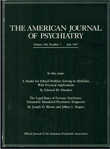P300 Latency in Geriatric Depression
Abstract
OBJECTIVE: The purpose of this study was to determine if P300 latency is prolonged in geri~atric depression and if longer P300 latency and deficits in initiation and errors of perseveration in depressed elderly patients are related to risk factors for vascular disease. METHOD: Geriatric patients with unipolar depression (N=43) and elderly comparison subjects (N=24) were assessed for depressive symptoms, cognitive functions, risk factors for vascular disease, and P300 latency. RESULTS: Depressed elderly patients had longer P300 latency than normal elderly subjects. In the depressed patients, P300 latency was related to deficits in initiation and errors in perseveration. Risk factors for vascular disease were associated not only with P300 latency but also with deficits in initiation and errors in perseveration. CONCLUSIONS: Functional impairment of the cortico-striato-pallido-thalamo-cortical pathways from vascular disease, implicated in late-life depressive disorders, may explain not only deficits in initiation and errors in perseveration but also longer P300 latency in depressed elderly patients. These results are preliminary and need further examination with brain imaging and more sensitive neuropsychological measures.



